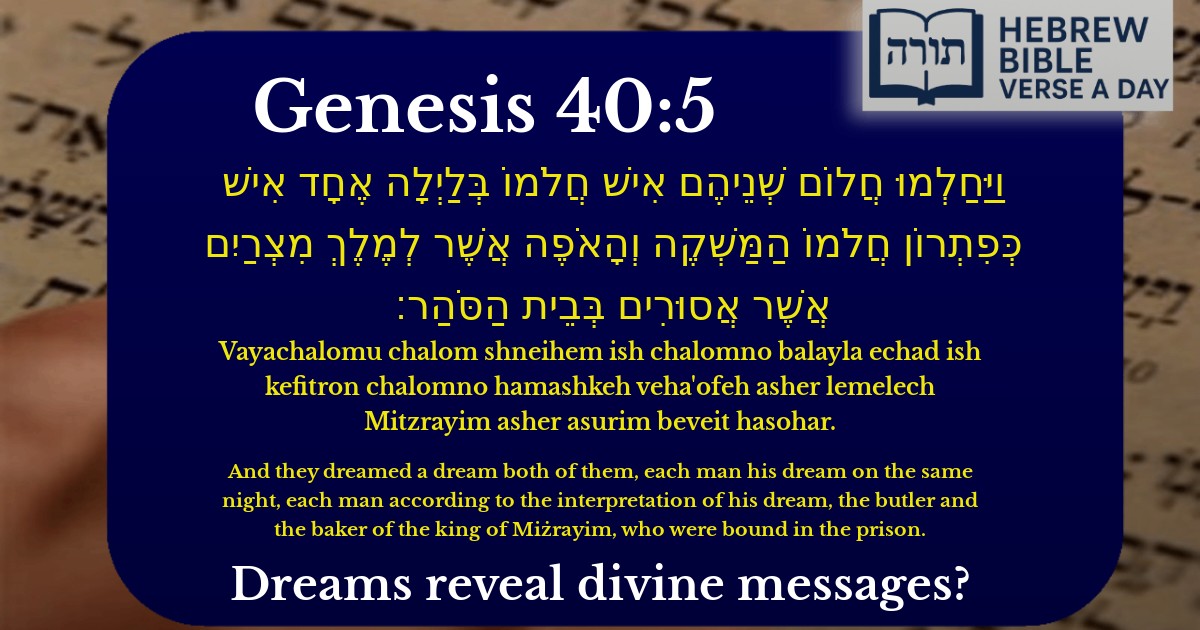Join Our Newsletter To Be Informed When New Videos Are Posted
Join the thousands of fellow Studends who rely on our videos to learn how to read the bible in Hebrew for free!
Hebrew Text
וַיַּחַלְמוּ חֲלוֹם שְׁנֵיהֶם אִישׁ חֲלֹמוֹ בְּלַיְלָה אֶחָד אִישׁ כְּפִתְרוֹן חֲלֹמוֹ הַמַּשְׁקֶה וְהָאֹפֶה אֲשֶׁר לְמֶלֶךְ מִצְרַיִם אֲשֶׁר אֲסוּרִים בְּבֵית הַסֹּהַר׃
English Translation
And they dreamed a dream both of them, each man his dream on the same night, each man according to the interpretation of his dream, the butler and the baker of the king of Miżrayim, who were bound in the prison.
Transliteration
Vayachalomu chalom shneihem ish chalomno balayla echad ish kefitron chalomno hamashkeh veha'ofeh asher lemelech Mitzrayim asher asurim beveit hasohar.
Hebrew Leining Text
וַיַּֽחַלְמוּ֩ חֲל֨וֹם שְׁנֵיהֶ֜ם אִ֤ישׁ חֲלֹמוֹ֙ בְּלַ֣יְלָה אֶחָ֔ד אִ֖ישׁ כְּפִתְר֣וֹן חֲלֹמ֑וֹ הַמַּשְׁקֶ֣ה וְהָאֹפֶ֗ה אֲשֶׁר֙ לְמֶ֣לֶךְ מִצְרַ֔יִם אֲשֶׁ֥ר אֲסוּרִ֖ים בְּבֵ֥ית הַסֹּֽהַר׃
וַיַּֽחַלְמוּ֩ חֲל֨וֹם שְׁנֵיהֶ֜ם אִ֤ישׁ חֲלֹמוֹ֙ בְּלַ֣יְלָה אֶחָ֔ד אִ֖ישׁ כְּפִתְר֣וֹן חֲלֹמ֑וֹ הַמַּשְׁקֶ֣ה וְהָאֹפֶ֗ה אֲשֶׁר֙ לְמֶ֣לֶךְ מִצְרַ֔יִם אֲשֶׁ֥ר אֲסוּרִ֖ים בְּבֵ֥ית הַסֹּֽהַר׃
🎵 Listen to leining
Parasha Commentary
📚 Talmud Citations
This verse is quoted in the Talmud.
📖 Berakhot 55b
The verse is referenced in a discussion about dreams and their interpretations, illustrating how dreams can have significant meanings.
📖 Chagigah 5b
Mentioned in the context of discussing divine communication through dreams, comparing the dreams of the butler and the baker to other biblical dreams.


The Dual Dreams of the Butler and Baker
The verse describes how both the butler (מַשְׁקֶה) and the baker (אֹפֶה) of Pharaoh dreamed dreams on the same night while imprisoned. Rashi (Bereshit 40:5) notes that the phrase "אִישׁ חֲלֹמוֹ" ("each man his dream") emphasizes that their dreams were distinct, each containing unique symbolism relevant to their individual fates. The dreams were not identical, but they occurred simultaneously, indicating Divine Providence at work.
The Significance of "כְּפִתְרוֹן חֲלֹמוֹ"
The phrase "כְּפִתְרוֹן חֲלֹמוֹ" ("according to the interpretation of his dream") suggests that the dreams themselves contained hints to their meanings. Ramban (Bereshit 40:5) explains that dreams in Tanach often follow a principle where their interpretations are embedded within their imagery. The butler’s dream of pressing grapes (Bereshit 40:9-11) hinted at his restoration to service, while the baker’s dream of birds eating bread (Bereshit 40:16-17) foreshadowed his execution.
Divine Timing and Preparation
The Midrash (Bereshit Rabbah 88:5) highlights that these dreams occurred "בְּלַיְלָה אֶחָד" ("on the same night") to set the stage for Yosef’s eventual rise to power. This was part of Hashem’s plan to bring Yosef before Pharaoh through the butler’s eventual recommendation. The Sforno adds that the shared timing underscores that these events were orchestrated by Divine will, not mere coincidence.
The Role of the Prison
The verse specifies that they were "אֲסוּרִים בְּבֵית הַסֹּהַר" ("bound in the prison"). The Kli Yakar (Bereshit 40:5) observes that their imprisonment was a necessary step in Yosef’s journey, as it placed him in proximity to these royal servants. This aligns with the Talmudic principle (Chullin 7b) that "a person does not prick his finger below unless it is decreed from Above"—meaning every detail is part of a larger Divine plan.